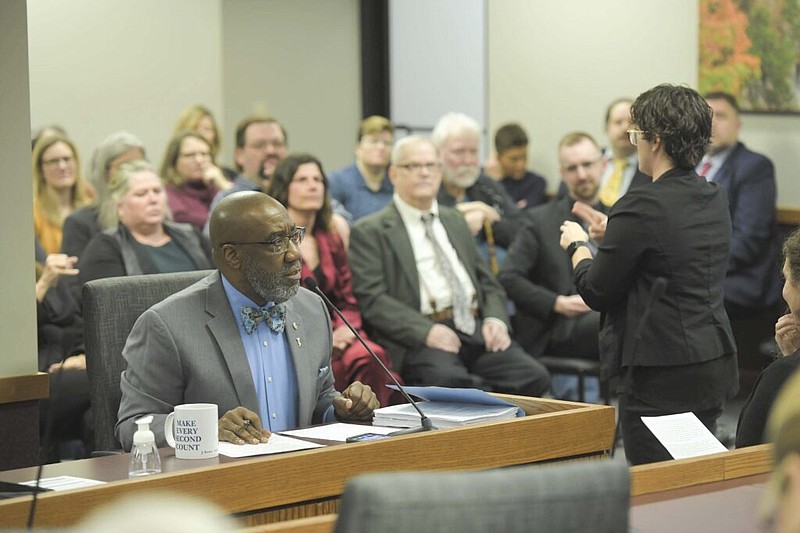Deaf and hard-of-hearing Missourians are hoping the governor signs a bill that, among other education-related provisions, would provide parents of deaf children with resources to prepare their kids for kindergarten.
The problem the bill seeks to address is a tendency for some deaf and hard-of-hearing kids to have delayed language acquisition. Advocates for the legislation say if milestones for kids under 5 are outlined and deaf leaders can provide parents with resources, more deaf and hard-of-hearing children will begin kindergarten with a foundational knowledge of language -- either English or American Sign Language.
The legislation is nicknamed LEAD-K, or language equality and acquisition for deaf kids. More than 20 states have adopted LEAD-K.
Sen. Greg Razer, D-Kansas City, and Rep. Jerome Barnes, D-Raytown, proposed LEAD-K bills this legislative session. Razer's bill was never heard in committee, and Barnes' passed committee after a lengthy public hearing was never debated by the full House.
Razer added the LEAD-K legislation in an amendment to an education bill that would create five adult high schools and revamp high school health class to "health and family education."
"The LEAD-K campaign is a result of the alarming number of deaf and hard of hearing children arriving at school without the language that they should have," Barnes said during the March hearing. "The evidence points to the fact that the current system of education for deaf kids is not working."
Barnes said during the hearing that he was inspired to push for the bill because of his adult daughter, who is deaf.
Currently, there is no standard process for assessing deaf children under 5. Kids with hearing loss sometimes arrive at kindergarten with "language deprivation," meaning they don't know as many words as they should at their age.
William Walker, spokesperson for Missouri LEAD-K, said this can happen when hearing parents don't prioritize teaching their deaf children a visual language like American Sign Language.
This legislation is aimed at assisting those parents by providing resources and giving developmental milestones specific to deaf and hard-of-hearing kids under 5.
"It's the same concept with hearing babies," Walker said. "There's a certain time where they should be babbling, saying their first words, talking, imitating speech patterns. But where is that for the deaf community?"
The milestones would be identified by a committee composed of largely deaf and hard-of-hearing members. It would work with the Department of Elementary and Secondary Education over a period of a year to finalize the milestones.
The committee would also find an assessment to track progress toward English literacy.
"As far as evaluation and figuring out who needs support, there is nothing like that (currently)," Walker said. "So if the LEAD-K bill gets passed, that forces them to evaluate the kids and know where their level is, what their needs are, and how we can support them."
The assessment would be used in the child's individualized education plan, or IEP, which schools use to find proper accommodations for children with disabilities. An IEP with a clearer picture of developmental milestones can help deaf and hard-of-hearing children get into the best classroom for them.
Paul Kiel, president of the Missouri Association of the Deaf, told the Independent the legislation should be able to catch children who begin to show signs of language deprivation. Whereas without set milestones, parents may not identify that their child is behind.
"In the past, a lot of deaf and hard-of-hearing children suffered from language deprivation for many years," he said. "It is time to close that gap and enable deaf and hard-of-hearing children more opportunities to gain language acquisition."
Kiel has been working to bring LEAD-K to Missouri since May 2016 when a nationwide Deaf Grassroots Movement brought activists to their state capitols to rally for legislation centered on their community.
Since then, multiple bills have been tried and failed. Walker feels confident in the current language and is focused on getting the information out to the deaf community.
Critics of the bill testified during the House hearing that it seemed to remove parents' choice. Most of the testimony against the bill was submitted in writing and matched nearly word-for-word in advocating for spoken English.
The bill would allow parents to choose English or ASL. It requires the Department of Elementary and Secondary Education to "make clear that parents have the right to select ASL, English or both for a child's language acquisition and developmental milestones."
But currently, there is not a system to evaluate deaf children according to some's preferred language: ASL.
Walker said four or five groups have opposed the bill during his six years as spokesman. He wishes some parents wouldn't focus so much on spoken English but instead work on developing their deaf or hard-of-hearing child's sign language.
"Now is the time to change and think of the deaf children and not necessarily from a hearing viewpoint, like thinking of cochlear implants or hearing aids," Walker said. "We deaf people have rights, too, and for the language to not be there, that impacts learning incredibly."
Gov. Mike Parson has until July 14 to sign or veto legislation.
The Missouri Independent, www.missouriindependent.com, is a nonprofit, nonpartisan news organization covering state government and its impact on Missourians.

